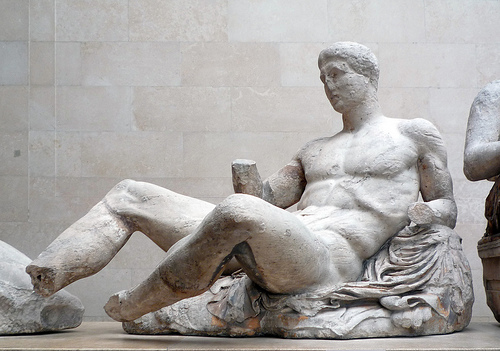Were it possible to suspend Greek statuary in the air somehow, Phidias himself might have sculpted Arjen Robben as he launches himself skyward, his face contorted into a mask of stupefied pain as a result of brushing his back foot against that of another human being.
Twenty minutes earlier, Robben, untouched, had leaped in the air as if a dog had bitten him.
Such gestures, while designed to simulate the effects of being tripped or otherwise fouled by an opposition player, look, in fact, nothing like the consequence of an actual trip or foul but are actually highly codified theatrical actions. They are to tell the referee, who is not there to feel the pain of being kicked in the legs, that someone’s been kicked in the legs.
The display has to be visual: screaming might not get you heard in a noisy stadium or if the referee is far away. And so you exaggerate the effects, just as an actor would on a stage, so that everyone can see. You raise your arms. You arch your back, propelling yourself forward as if to clear a ditch full of fire. You let your entire body splash onto the ground, as you would on water, to emphasise your utter inability to maintain or regain an erect posture.
Finally, you lie there, waiting for the whistle. And, if the whistle doesn’t come, the second act consists of your disbelieving reaction at being disbelieved. How could this be? You are astonished, aghast that the referee could have failed to see what just happened, and that anyone might think you faked any of it.
Arjen Robben may be the foremost current practitioner of the art of the football dive, which dates all the way back to … I couldn’t exactly tell you. No-one seems to be able to go back very far. This list of the 9 top football divers of all time, this one of the 10 worst football dives in history, and this one of the 25 top football divers of all time feature players who are almost all still active. The oldest among the exceptions is the still relatively-recent Jurgen Kilnsmann, author of a shocking dive during the 1990 World Cup final that saw Argentine defender Pedro Monzon sent off.
But surely diving existed long before that.
As a matter of fact, the first competitive match I ever attended, a Juventus–Perugia played in the spring of 1981, featured a dive by – I think – Pierino Fanna that netted Juventus a penalty and the game’s equaliser. I couldn’t find any footage, but my recollection is that Fanna jumped over the tackling player’s legs and fell to the ground, without flailing his arms or much else by way of embellishment.
The modern dive, which I would call hyperreal, may have been pioneered by the aforementioned Klinsmann.
In the hyperreal dive, you are always faking – whether or not you are actually being fouled. Faking is the condition for arguing that something real has just happened, or worse, the only way that the real can be apprehended. While it may seem paradoxical that the hyperreal dive has flourished when television technology has increased several-fold our ability to slow-down and magnify sporting actions, it is not much of a paradox at all. Not only because the primary audience for the dive is still the match officials, who have no immediate access to technology (although the review panels who occasionally punish divers do), but also because the nature of the spectacle has evolved in the direction of hyperrealism. Think of the montages that follow most international fixtures, in which the highlights of the game are played in slow-motion to the latest dirge, often emphasising the emoting of players of spectators, as if what has just happened has already become an object of nostalgia or historical appreciation and has to be hyperremembered.
To the extent that any of this is a problem in sport (or a problem of sport), it’s because sport as an organised human activity owes much of its appeal to its claim to truth. Most of us laugh at professional wrestling – or more accurately at its fans – because we know that professional wrestling is a scripted spectacle. By contrast, football and other proper sports purport to stage performances that obey certain rules but whose outcome isn’t predetermined. That is why accusations of match-fixing, even more so than drug cheating, hit at the heart of any sport: they undermine that claim to truth.
The hyperreal dive occupies a more ambiguous place.
On the one hand, it may be seen as simply a part of the game: if you can fool the referee, your team will gain an advantage; otherwise you might get a booking.
On the other hand, it calls attention to the ways in which football and pro-wrestling aren’t quite so unlike each other as we might like to believe. The aspects of performance that have little to do with athleticism or footballing talent, the power and influence of some footballing nations as opposed to others, and all the respects in which that claim to truth – that a winner will emerge from a fair competition among the world’s playing nations – can be peeled back, layer by layer, until we see how in almost all ways it just isn’t so.









